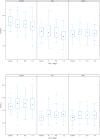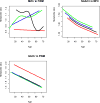Persistence of HIV-associated cognitive impairment, inflammation, and neuronal injury in era of highly active antiretroviral treatment
- PMID: 21297425
- PMCID: PMC4326227
- DOI: 10.1097/QAD.0b013e3283427da7
Persistence of HIV-associated cognitive impairment, inflammation, and neuronal injury in era of highly active antiretroviral treatment
Abstract
Objective: To determine whether cognitive impairment and brain injury as measured by proton magnetic resonance spectroscopy (MRS) persist in the setting of HAART.
Design: This study is an observational cohort study.
Methods: MRS was performed in 268 patients: HIV-negative controls (N = 28), HIV-positive neuroasymptomatic individuals (N = 124), and individuals with AIDS dementia complex (ADC; N = 50) on stable antiretroviral therapy (ART) with a mean duration of infection of 12 years and CD4 cell count of 309 cells/μl. Four metabolites were measured over creatine: N-acetyl aspartate (NAA), marker of neuronal integrity; choline (Cho), myoinositol, markers of inflammation, and glutamate and glutamine (Glx) in the basal ganglia, frontal white matter (FWM), and mid-frontal cortex. Analyses included analysis of variance, analysis of covariance, linear, and nonparametric regression models.
Results: Cognitive impairment was found in 48% of HIV-infected individuals. Both HIV-positive groups showed significant increases in myoinositol/creatine or Cho/creatine in all brain regions when compared to controls; a significant decrease in Glx/creatine in the FWM was observed in the neuroasymptomatic group; and only individuals with ADC showed a significant reduction in NAA/creatine, although a significant trend for decreasing NAA/creatine in the basal ganglia was found across the groups. Effects related to aging and duration of infection, but not central nervous system penetration effectiveness were observed.
Conclusion: Brain inflammatory changes remain ubiquitous among HIV-infected individuals, whereas neuronal injury occurs predominantly in those with cognitive impairment. Together these findings indicate that despite the widespread use of HAART, HIV-associated cognitive impairment and brain injury persist in the setting of chronic and stable disease.
Conflict of interest statement
Conflicts of Interest: None
Figures



References
-
- Navia BA, Jordan BD, Price RW. The AIDS dementia complex: I. Clinical features. Ann Neurol. 1986;19(6):517–24. - PubMed
-
- Price RW, Brew BJ. The AIDS dementia complex. J Infect Dis. 1988;158(5):1079–83. - PubMed
-
- Palella FJ, Jr, Delaney KM, Moorman AC, Loveless MO, Fuhrer J, Satten GA, et al. Declining morbidity and mortality among patients with advanced human immunodeficiency virus infection. HIV Outpatient Study Investigators. N Engl J Med. 1998;338(13):853–60. - PubMed
-
- Ledergerber B, Egger M, Opravil M, Telenti A, Hirschel B, Battegay M, et al. Clinical progression and virological failure on highly active antiretroviral therapy in HIV-1 patients: a prospective cohort study. Swiss HIV Cohort Study. Lancet. 1999;353(9156):863–8. - PubMed
MeSH terms
Grants and funding
LinkOut - more resources
Full Text Sources
Other Literature Sources
Medical
Research Materials

